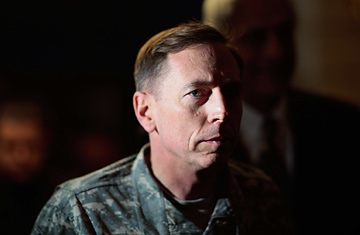
General David Petraeus arrives for a meeting with Secretary of Defense Robert Gates and Iraqi Prime Minister Nouri al-Maliki, December 5, 2007, in Baghdad.
Things in Iraq today are worse than they were a month ago, but they're far better than they were last September, when Ambassador Ryan Crocker and General David Petraeus last testified before Congress. This Tuesday and Wednesday, Crocker and Petraeus will remind lawmakers how far Iraq has come since the "surge" of 30,000 additional U.S. troops arrived in Iraq last year. Expect at least two of their interlocutors, Senators Hillary Clinton and Barack Obama, to focus on recent setbacks — increased violence, a continuing political stalemate, and mounting strains on the U.S. military — as both seek to demonstrate to the gallery how they might run the Iraq war if elected to the White House seven months from now.
Last fall's testimony by Washington's top diplomat and military man in Baghdad was a high-wire act, as the surge was just beginning to take effect. A year later, lawmakers are expected to acknowledge progress on the security front, but will demand to know what's next. Eager to preserve the fragile gains, Petraeus is expected to urge a pause in U.S. troop withdrawals after this summer, when overall American troop strength in Iraq will fall from 160,000 to about 140,000. Petraeus has said he is leery of jeopardizing the gains of the past year if the withdrawals continue beyond that.
Some Pentagon officials, including Defense Secretary Robert Gates, had hoped to continue the drawdown in order to relieve the strain of repeated combat tours on U.S. troops and their families. But Gates recently sided with Petraeus on the wisdom of a period of "consolidation and assessment" expected to last at least several weeks, and possibly months. Gates and Admiral William Fallon, the outgoing chief of the U.S. Central Command and Petraeus's direct superior, have expressed concern that leaving 140,000 troops in Iraq will continue to erode U.S. military readiness. But President Bush, mindful of the centrality of Iraq to his legacy, has made clear that what Petraeus wants, Petraeus will get.
That, of course, is the point. Come noon on January 20, Petraeus will have a new boss. While Petraeus will hear words of praise and support from one of the applicants for that job — Senator John McCain, a senior member of the Armed Services Committee — the other two will question him sharply. "Essentially, what we've seen both from the Administration and from John McCain," Obama said Friday, "is a trumpeting of improvements from a horrific situation to simply a unsustainable and intolerable situation." Both Obama and Clinton have called for a faster drawdown. How they will joust with Petraeus could offer insights into their commander-in-chief bona fides.
Both Democratic presidential candidates will be able to point to the recent fighting in the southern city of Basra as evidence of poor Iraqi leadership and ill-prepared and unmotivated U.S.-trained Iraqi troops. While Iran helped negotiate a deal that curbed the fighting in Basra, Tehran continues to supply Shi'ite groups linked to cleric Moqtada al Sadr with lethal weapons and training that continue to take a toll on U.S. forces, Pentagon officials say. That, they add glumly, suggests Iran could continue a game of hard-nosed cat-and-mouse for as long as U.S. troops are in Iraq.
Clinton and Obama also will be able to cite a recent article by an Army officer and West Point history professor who has served two tours in Iraq arguing that Petraeus's counter-insurgency strategy is dulling the U.S. military's ability to wage a major conventional war. "This hyper-emphasis on counterinsurgency puts the American Army in a perilous condition," Lieutenant Colonel Gian Gentile wrote last month. "Its ability to fight wars consisting of head-on battles using tanks and mechanized infantry is in danger of atrophy." Gentile argues that it was the cease-fire declared last year by Sadr as well as the U.S. military's alliance with former Sunni militants against al-Qaeda that were more important than the surge in turning the tide in Iraq.
The recent violence in Basra shows how tenuous what passes for peace in Iraq really is. And William Odom, a retired three-star Army general, has spelled out just how shaky that alliance with the Sunnis is. "Our new Sunni friends insist on being paid for their loyalty," Odom told the Senate Foreign Relations committee last Wednesday. He cited one estimate that the U.S. military is paying a local strongman $250,000 a day to keep the peace in a 36-square mile swath of the country. "Remember, we do not own these people, we rent them — and they can break the lease at any moment."
So, despite the tentative calm, the situation in Iraq is actually getting worse, Odom said. It has led to a proliferation of militias loyal to local warlords, who, in turn, are loyal to various political leaders. "This can hardly be called military stability, much less progress toward political consolidation," he added. "To call it fragility that needs more time to become success is to ignore its implications."
